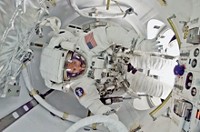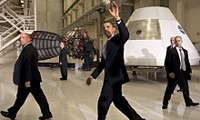Advertisement
Grab your lab coat. Let's get started
Welcome!
Welcome!
Create an account below to get 6 C&EN articles per month, receive newsletters and more - all free.
It seems this is your first time logging in online. Please enter the following information to continue.
As an ACS member you automatically get access to this site. All we need is few more details to create your reading experience.
Not you? Sign in with a different account.
Not you? Sign in with a different account.
ERROR 1
ERROR 1
ERROR 2
ERROR 2
ERROR 2
ERROR 2
ERROR 2
Password and Confirm password must match.
If you have an ACS member number, please enter it here so we can link this account to your membership. (optional)
ERROR 2
ACS values your privacy. By submitting your information, you are gaining access to C&EN and subscribing to our weekly newsletter. We use the information you provide to make your reading experience better, and we will never sell your data to third party members.
Policy
Lacking Funds For Space Exploration
Space Policy: NASA must change human exploration goals or budget, review finds
by Susan R. Morrissey
September 14, 2009
| A version of this story appeared in
Volume 87, Issue 37

NASA’s human space flight program is unsustainable at current levels of funding, according to a summary report released on Sept. 8 by a blue-ribbon panel that assessed the agency’s plans for human exploration. Changes to either NASA’s goals for exploration or its annual budget are necessary, the report says.
“The Committee finds that no plan compatible with the FY 2010 budget profile permits human exploration to continue in any meaningful way,” the panel states in its 12-page summary. For a human exploration program to meet its stated goals, the panel says, NASA must receive $3 billion more per year beginning with its 2010 budget, which is set in the presidential request at $18.7 billion.
“In absolute terms, it’s not that much more money,” says John M. Logsdon, an emeritus professor at George Washington University’s Space Policy Institute. “But whether it is politically feasible given everything else that’s going on is a judgment” call for President Barack Obama.
The summary report provides five options for NASA’s human space exploration; two could be carried out without a budget increase with less than optimal results, and three would be possible only with additional funds. In all options, the space shuttle, which was set to retire in 2010, would continue flying until 2011. One scenario extends space shuttle flights to 2015. Under all options, the earliest that space shuttle replacements would be ready is 2016.
In three of the five options, the lifetime of the International Space Station, which is nearly complete and beginning to ramp up its science activities, would be extended to 2020; the station is budgeted to operate through 2015.
In response to the summary report, the White House issued a statement reaffirming the President’s commitment to human space exploration. Once the complete report is released later this month, the Administration is expected to swiftly make decisions that will be reflected in the 2011 budget cycle.
In the meantime, committees in both houses of Congress are set to hold hearings on the panel’s findings this week. Because appropriations are not yet finalized for 2010, Congress can still make changes to NASA’s 2010 budget. It is unclear, however, whether they will do so or wait for the Administration to act.
“The ball is squarely in President Obama’s court” when it comes to deciding the future of NASA’s human space flight program, Logsdon says.




Join the conversation
Contact the reporter
Submit a Letter to the Editor for publication
Engage with us on Twitter